|
 Secure Site
Secure Site
|
 |
Archive for October, 2012
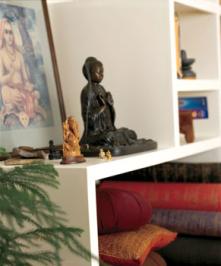 find a quiet place to meditate You should find a simple, uncluttered, quiet place where you will not be disturbed. Sit on the floor with a cushion under you or in a firm chair, with your back straight and your eyes closed. Then bring your awareness slowly down through your body, allowing all of the muscles to relax except those that are supporting your head, neck, and back. Take your time and enjoy the process of letting go of the tension in your body. Meditation is the art and science of letting go, and this letting go begins with the body and then progresses to thoughts.
adapted from Yoga International by Swami Rama
Our unique “Zen Clock” features a long-resonating acoustic chime that brings the meditation session to a gradual close, preserving the environment of stillness while also acting as an effective time signal.
It’s exquisite sounds summon your consciousness out of your meditative state with a series of subtle gongs. Once you experience the Zen Timepiece’s progressive tones, you’ll never want to meditate any other way. It serves as the perfect meditation timer. Available in 5 wood styles, including bamboo.
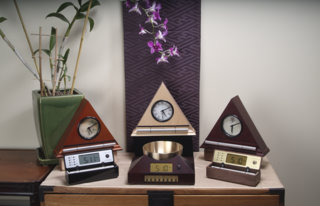 meditation timers and clocks Now & Zen’s Meditation Timer Store
1638 Pearl Street
Boulder, CO 80302
(800) 779-6383
Posted in Meditation Timers, Meditation Tools, mindfulness practice
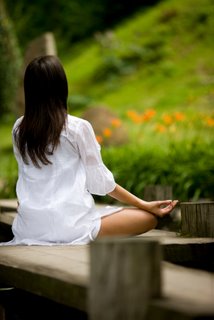 meditation One of the immediate benefits experienced through meditation is that you will be able to slow down and be conscious of your thoughts. Many times we assume the thoughts in our mind are real because we perceive and experience them. When we slow down our thoughts (especially those of stress and danger) and we look at our self-talk while we are flipping out, we are using that muscle in our mind we developed that allows us to be in the driver’s seat and examine our thoughts. Challenge them and ask yourself if those thoughts are helpful to you.
Use our unique “Zen Clock” which functions as a Yoga & Meditation Timer. It features a long-resonating acoustic chime that brings your meditation or yoga session to a gradual close, preserving the environment of stillness while also acting as an effective time signal. Our Yoga Timer & Clock can be programmed to chime at the end of the meditation or yoga session or periodically throughout the session as a kind of sonic yantra. The beauty and functionality of the Zen Clock/Timer makes it a meditation tool that can actually help you “make time” for meditation in your life. Bring yourself back to balance.
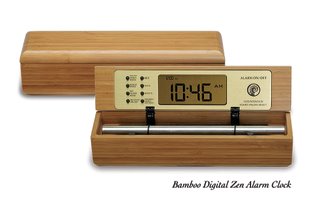 meditation timers adapted from Natural Solutions Magazine, by Jill Englund, April 2011
Now & Zen – The Zen Timer Shop
1638 Pearl Street
Boulder, CO 80302
(800) 779-6383
Posted in Meditation Timers, Meditation Tools, mindfulness practice, Well-being
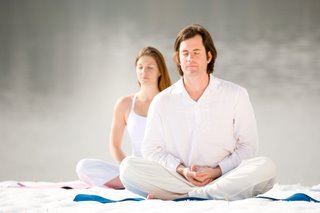 how to stay awake during meditation Most people agree that it’s easier to stay focused (and awake) during relaxation practices when there is an external source of directions to follow. A well-balanced asana class should include a brief relaxation practice, and there are many fine relaxation practices available on CD or cassette for home use. Try to choose one that is fairly simple and that focuses your attention inward rather than on intriguing melodies or complicated visualizations. To make the experience more personal, you could record your own favorite systematic relaxation exercise. Your capacity to remain awake will naturally increase with regular practice, and you should be able to internalize the exercise in short order. This will free you from instructors and recordings.
It is also helpful to maintain a systematic relaxation practice outside of regular asana classes (you’ll make it through the practice with much more alertness by doing some asana or stretching first to energize the body and shake off any feelings of sloth and inertia). Because the body expends a good amount of energy digesting food, a full stomach might cause sleepiness, so it’s best to wait two hours after meals to do a practice. And finally, avoid doing the practice in bed—you’ve already got a (good) habit of falling asleep in that space.
When the mind begins to drift away from waking reality, there is a crucial moment in which you realize, I’m falling asleep. Being aware in that moment is the first step toward pulling the mind back to the practice. Remind yourself that you are determined to stay awake and complete the practice you have begun. Sometimes that level of awareness is all it takes to establish a new relationship with your mind. But if that doesn’t work, give the mind a little activity to balance the resistance of tamas.
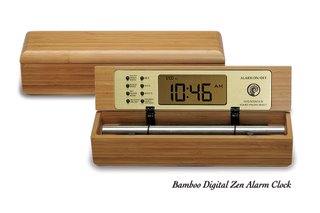 Bamboo Meditation Chime When you know you’re falling asleep, it’s time to direct the mind to a more dynamic object of attention. The most readily available object is the breath. While still quite subtle, it is more tangible than the sensations of the resting body, and its natural movements should give the mind just enough activity to overcome sleepiness. Yoke the mind to the breath and observe how the body reacts to the influx of refreshing oxygen. You will find that the breath lengthens and deepens when you give it your full attention, but there’s no need to get involved with this process.
If following the breath doesn’t give your awareness enough stimulation, shift your focus to the body, which is considerably more tangible than the breath. Try lightly tensing and releasing a specific muscle group (an arm, a leg, the face). Coordinate the muscle activity with the breath so that you tense on exhalation and release on inhalation. With the mind yoked to the body and breath, there is little room for it to wander off into slumber.
As long as your awareness is firmly in your body, you will get some benefit from the practice, even if you are not following a formal systematic relaxation sequence. The mindfulness you cultivate while attending to the body and breath will transfer to a systematic relaxation practice as your capacity increases. When you feel confident that you won’t drift into sleep, go ahead and pick up where you left off in the relaxation practice. If you are following directions from a taped or live teacher, don’t worry about having missed parts of the body, just jump back in wherever they are. If you are doing the practice without an external source of directions, pick up where you left off. This trains the mind to follow instructions and finish what it starts.
If these more tangible sensations don’t bring you back to waking awareness, you can roll over into the crocodile pose and proceed with the exercise in that position. The crocodile is still a resting pose, but it is very difficult to fall asleep in that position.
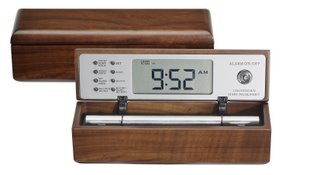 Meditation Timer and Alarm Clock with Soothing Chime Keep in mind that a persistent inability to stay awake in relaxation practices may signal chronic fatigue, which is an increasingly common condition. It sounds strange, but you can be too tired to relax. An overactive schedule, stale food, and a sedentary lifestyle all erode your vitality. The physical aspects of yoga can provide an antidote, but only if we create the space in our lives to practice them with our full attention. The best way to make sure you stay awake during a systematic relaxation is to establish regular sleeping habits, get sufficient nourishment, and exercise regularly. In other words, take good care of yourself. It also helps to use relaxation practice as a preventative measure rather than an emergency intervention. And remember that practically everyone falls asleep during relaxation practices at one time or another, so don’t be too hard on yourself when it happens to you.
Although meditation can be done in almost any context, practitioners usually employ a quiet, tranquil space, a meditation cushion or bench, and some kind of timing device to time the meditation session. Ideally, the more these accoutrements can be integrated the better. Thus, it is conducive to a satisfying meditation practice to have a timer or clock that is tranquil and beautiful. Using a kitchen timer or beeper watch is less than ideal. And it was with these considerations in mind that we designed our digital Zen Alarm Clock and practice timer. This unique “Zen Clock” features a long-resonating acoustic chime that brings the meditation session to a gradual close, preserving the environment of stillness while also acting as an effective time signal.
adapted from Yoga Internation, January/February 2006
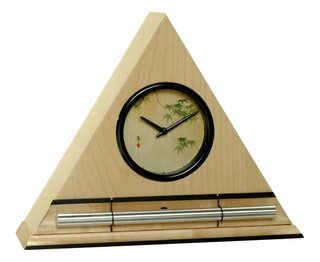 Meditation Timers and Chime Alarm Clocks for a Peaceful Awakening Now & Zen’s Meditation Timer Store
1638 Pearl Street
Boulder, CO 80302
(800) 779-6383
Posted in Well-being
 meditation A long-term benefit of meditation is that you are able to be in line with yourself and the world around you. You are way more alert and in a more peaceful state of being. Not to mention that you will have lower blood pressure, reduced risk of cardiovascular disease by increasing circulation, reduced insulin resistance, reduced mortality rates, and reduced heart-rate variability. In some ways, it’s the perfect antidote to the amount of stress we have in our daily lives.
“The Zen Alarm Clock & Chime Timer’, uses soothing acoustic chimes that signal it’s time – gently and gradually.
Rather than an artificial recorded sound played through a speaker, the Zen Clock features an alloy chime bar similar to a wind chime. When the clock’s alarm is triggered, its chime produces a long-resonating, beautiful acoustic tone reminiscent of a temple gong.
adapted from Natural Solutions Magazine, by Jill Englund, April 2011
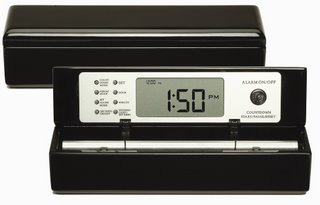 Timers with chime, perfect for meditating day or night...
Now & Zen’s Meditation & Yoga Timer Store
1638 Pearl Street
Boulder, CO 80302
(800) 779-6383
Posted in Meditation Timers, Meditation Tools, mindfulness practice, Well-being
 how not to fall asleep during mindfulness practices Why Not Sleep?
The practice of systematic relaxation is a time for quiet observation of the body. In practical terms, this consists of bringing our awareness to different parts of the body in an established sequence. It’s a bit like shining a flashlight around a dark room and taking an inventory of what is there. The more we shine the light of awareness around, the more familiar we become with our bodily furniture and its arrangement. Giving attention to each part of the body brings our awareness to habitual patterns of muscle tension and highlights areas that might need a little extra attention during asana practice.
There is so much in our room (the body) that we can easily overlook something. That is one reason a system is essential to the experience. Having a set sequence to follow ensures that we don’t miss any part. Following the same sequence every time creates a pattern for the mind to follow. With repetition, this pattern becomes ingrained in the mind. And when this happens, you can devote less of your mental energy to remembering the sequence and are free to concentrate fully on more subtle aspects of the self.
Systematic relaxation refreshes the body and mind, but it has more important implications for yoga practice. It is a deceptively simple process, but diligent practice can open the door to a rich interior landscape. When done after asana practice, it helps the body integrate the subtle changes induced by the postures and reinforces those changes on a deeper level. As a method of drawing attention inward (pratyahara), it helps the transition into formal meditation practice. And perhaps most important, it encourages a relaxed, observant state of mind in daily life.
None of these things happen, however, when we are sleeping. The benefits of systematic relaxation come from the attention we bring to the practice itself. If that isn’t enough to keep you awake during relaxation practices, consider the effect your nap might have on those around you in a class: it’s really hard to concentrate on a subtle experience of the self when the person next to you is engaged in some not-so-subtle snoring.
adapted from Yoga International, January/February 2006
Use our unique “Zen Clock” which functions as a Yoga & Meditation Timer, as well as a gentle Alarm Clock. It features a long-resonating acoustic chime that brings your meditation or yoga session to a gradual close, preserving the environment of stillness while also acting as an effective time signal. Our Yoga Timer & Clock can be programmed to chime at the end of the meditation or yoga session or periodically throughout the session as a kind of sonic yantra. The beauty and functionality of the Zen Clock/Timer makes it a meditation tool that can actually help you “make time” for meditation in your life. Bring yourself back to balance.
 Timers and Clocks with Chime in Bamboo, Walnut, Maple, and Black Lacquer Now & Zen’s Yoga Timer Store
1638 Pearl Street
Boulder, CO 80302
(800) 779-6383
Posted in Meditation Timers, Meditation Tools, mindfulness practice
 meditation As time progresses, you may find that you enjoy the positive results of meditation—increased joyfulness, clarity, and awareness—as much as you enjoy the relief you experience from releasing the physical, nervous, and mental symptoms of stress. Meditation is therapeutic from the beginning. It helps relax the autonomic nervous system, and thus provides freedom from muscular tension as well as mental stress. A person of meditation gradually attains a tranquil mind, and this helps the immune system by limiting its reaction to stress and strain. You will find that even a few weeks’ sincere effort will help you control your appetites to a certain degree, and even your reactions such as anger. Meditation will also decrease your need for sleep and energize your body and mind; it is a systematic means for enhancing your innate talents. I have observed this result with students from all walks of life.
Meditation also has a positive influence on health. In the modern world, scientists have begun to recognize that most diseases can be classified to some degree as psychosomatic, as having their origin in thoughts and emotions—or at least being influenced by them. And if disease originates in your mind and your emotional reactions, how can an external therapy alone restore your health? You will become dependent on a therapist or physician for help if you do not seek to understand your own mind and emotions. In contrast, meditation makes you self-reliant and helps you attain the inner strength you need for dealing with all of life’s problems.
adapated from Yoga International, by Swami Rama
Use our unique “Zen Clock” which functions as a Yoga Timer. It features a long-resonating acoustic chime that brings your meditation or yoga session to a gradual close, preserving the environment of stillness while also acting as an effective time signal. Our Yoga Timer & Clock can be programmed to chime at the end of the meditation or yoga session or periodically throughout the session as a kind of sonic yantra. The beauty and functionality of the Zen Clock/Timer makes it a meditation tool that can actually help you “make time” for meditation in your life. Bring yourself back to balance.
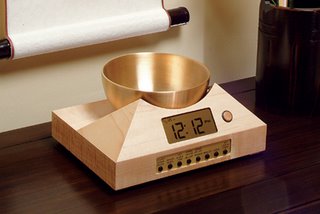 Meditation Tools Now & Zen – The Singing Bowl Meditation Timer Store
1638 Pearl Street
Boulder, CO 80302
(800) 779-6383
Posted in Meditation Timers, Meditation Tools, mindfulness practice
 meditation How important is it to sit precisely at the same time each day? The discipline of maintaining a fixed meditation or prayer time is extraordinarily beneficial. That’s why this practice is maintained by so many traditions, from Islam with its calls to prayer, to the Divine Office (matins, lauds, etc.) that measures the day for many Christian monks and nuns.
But maintaining an unwavering time for meditation demands a level of discipline and detachment from affairs that may not be practical—or even desired. For those of us with families, there are many occasions when our responsibilities may conflict with our meditation time. So, while a fixed time for meditation is certainly praiseworthy, it may not be the way your personal practice evolves.
As an experiment, try sitting at approximately the same time each day. You’ll soon develop a rhythm that will gradually reinforce itself. After you’ve tried it for a while, you can then decide how strictly you would like, or are able, to observe a fixed meditation time.
Although meditation can be done in almost any context, practitioners usually employ a quiet, tranquil space, a meditation cushion or bench, and some kind of timing device to time the meditation session. Ideally, the more these accoutrements can be integrated the better. Thus, it is conducive to a satisfying meditation practice to have a timer or clock that is tranquil and beautiful. Using a kitchen timer or beeper watch is less than ideal. And it was with these considerations in mind that we designed our digital Zen Alarm Clock and practice timer. This unique “Zen Clock” features a long-resonating acoustic chime that brings the meditation session to a gradual close, preserving the environment of stillness while also acting as an effective time signal.
adapted from Yoga International by Rolf Sovik, May/June 2007
 bamboo meditation tools Now & Zen – The Meditation Timer Store
1638 Pearl Street
Boulder, CO 80302
(800) 779-6383
Posted in Meditation Timers, Meditation Tools, mindfulness practice, Well-being
 sleep tips Tools for Better Sleep
Guests at the Ritz-Carlton, Kapalua can experience a new program called “Sleep Fit”. Developed by Claudia Micco, mind-body-fitness director, its aim is to provide guests with a better understanding of themselves. “We’re offering them the tools,” says Micco. “If they want to continue the work at home, they’ll have the tools. They can look at what personal obstacles they need to overcome to improve the quality of sleep and therefore improve the quality of life.” Here, Micco shares her top sleep tips.
1. Develop sleep rituals. This releases the build-up of daily tension and builds a positive attitude as you prepare for sleep. Simple practices such as showering, bathing, stretching, journaling, relaxation, and yoga breathing can help your body prepare for a good night’s sleep.
2. Take time to wind down gradually. Dimming the lights or turning the TV or computer off one or two hours before going to bed can help.
3. Once you are in bed, welcome and surrender to sleep.
4. Explore any resistance to sleep. Give yourself permission to notice your thoughts without attaching a story to them.
5. Count your breaths. Inhale and exhale 1, inhale and exhale 2, and so on. If you lose count, begin again at 1.
6. If all else fails and you really can’t sleep, get out of bed for a while, but keep the room dimly lit and try some light reading. Stay away from the TV and computer!
7. Develop waking rituals. Practice waking up with a relaxed attitude. Wake up gradually and take a few moments to notice your surroundings. Use your Zen Alarm Clock to wake you gradually and progressively with calming chimes.
8. Notice your in breath and your out breath as you wake up. Visualize a great day ahead!
9. Get rid of the annoying alarm clock; it will disrupt your whole day! Look for a Zen Alarm Clock, or wake up to soft music.
10. Stick to healthy eating, moderate aerobic exercise, and drop the caffeine and alcohol for good night zzzz’s.
adapted from Organic Spa Magazine, by Mary Bemis
Boulder, Colorado—an innovative company has taken one of life’s most unpleasant experiences (being startled awake by your alarm clock early Monday morning), and transformed it into something to actually look forward to. “The Zen Alarm Clock,” uses soothing acoustic chimes that awaken users gently and gradually, making waking up a real pleasure. Rather than an artificial recorded sound played through a speaker, the Zen Clock features an alloy chime bar similar to a wind chime. When the clock’s alarm is triggered, its chime produces a long-resonating, beautiful acoustic tone reminiscent of a temple gong. Then, as the ring tone gradually fades away, the clock remains silent until it automatically strikes again three minutes later. The frequency of the chime strikes gradually increase over ten-minutes, eventually striking every five seconds, so they are guaranteed to wake up even the heaviest sleeper. This gentle, ten-minute “progressive awakening” leaves users feeling less groggy, and even helps with dream recall.
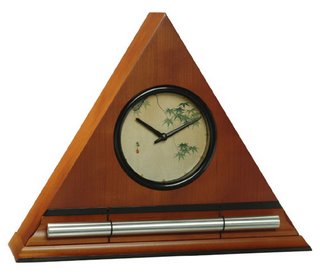 Honey Japanese Maple Leaves Zen Alarm Clock, chime alarm clocks and natural sounding timers
Now & Zen’s Acoustic Alarm Clock Store
1638 Pearl Street
Boulder, CO 80302
(800) 779-6383
Posted in Chime Alarm Clocks, Natural Awakening, sleep, Sleep Habits, wake up alarm clock, Well-being
 finding balance Myth: Imbalance will result in disaster.
Truth: Imbalance is opportunity.
Maybe you sense that your balance is slipping. Put those moments in perspective. We have to occasionally lose our balance in order to regain it. The mistake we often make is accepting our imbalances as part of who we are — giving up instead of trying to recover balance.
You may not want to believe you’ve taken on too much, for instance, because you want to do it all and are hesitant to let anything go — whether it’s a job, obligation, or opportunity. Consider what kinds of imbalances have been affecting you, physically, mentally, emotionally, or spiritually; pay attention to when and how you experience it.
When one area of your life is imbalanced, it can affect the others. Rather than view your imbalance as a mistake to fix, see it for what it is: an opportunity to rediscover balance in a new way.
Use our unique “Zen Clock” which functions as a Yoga Timer. It features a long-resonating acoustic chime that brings your meditation or yoga session to a gradual close, preserving the environment of stillness while also acting as an effective time signal. Our Yoga Timer & Clock can be programmed to chime at the end of the meditation or yoga session or periodically throughout the session as a kind of sonic yantra. The beauty and functionality of the Zen Clock/Timer makes it a meditation tool that can actually help you “make time” for meditation in your life. Bring yourself back to balance.
adapted from Body + Soul
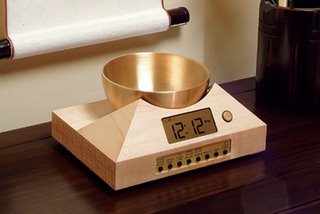 Singing Bowl Meditation Timers and Clocks Now & Zen’s Singing Bowl Meditation Timer Store
1638 Pearl Street
Boulder, CO 80302
(800) 779-6383
Posted in Meditation Timers, Meditation Tools, mindfulness practice, Well-being
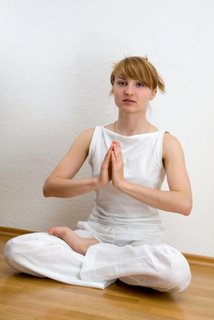 yoga Sooner or later, most of us feel a little depressed or anxious, and certainly all of us know what it’s like to feel tired. There are many different ways of treating these feelings, from exercise to meditation, from medication to a long vacation in Hawaii. But you may not realize that you have a safe, effective, and inexpensive remedy right at hand for each of these conditions. What is this magical elixir? Your own breath.
As yogis have known for centuries—and as medical science is beginning to discover—the breath has amazing recuperative powers. By controlling the breath (a practice called pranayama), the yogis found, they could alter their state of mind. The three pranayama practices described here primarily create their effects by slowing and regularizing the breath. This engages what scientists call the parasympathetic nervous system, a complex biological mechanism that calms and soothes us.
How does slower breathing help? In stressful times, we typically breathe too rapidly. This leads to a buildup of oxygen in the bloodstream and a corresponding decrease in the relative amount of carbon dioxide, which in turn upsets the ideal acid-alkaline balance—the pH level—of the blood. This condition, known as respiratory alkalosis, can result in muscle twitching, nausea, irritability, lightheadedness, confusion, and anxiety.
In contrast, slowing the breath raises the carbon dioxide level in the blood, which nudges the pH level back to a less alkaline state. As the blood’s pH changes, the parasympathetic nervous system calms us in a variety of ways, including telling the vagus nerve to secrete acetylcholine, a substance that lowers the heart rate.
Know Your Breath
Now please note that I’m not recommending that you try to breathe away chronic anxiety, fatigue, or depression. None of these conditions is easily or safely self-treated. In fact, tackling them by yourself, without professional supervision, could make them worse. But your breath can be a powerful ally in coping with temporary physical and emotional states—whether you’re despondent about an argument with a close friend, apprehensive about an upcoming job interview, or exhausted after a tough day at work.
 Use Your Chime Timer to Breathe Away Anxiety - Eisen Keisai, Woman Getting out of a Mosquito Net As with any treatment, the breathing remedy must be administered intelligently and judiciously to be fully effective. Each condition responds best to its own special breath. To calm anxiety, for example, you can purposely lengthen your exhalations; to alleviate dullness and fatigue, you can lengthen your inhalations. And to lift yourself out of an emotional pit, it’s most effective to equalize the lengths of your inhalations and exhalations.
If you want your breath to work as an extra-strength remedy, it’s a good idea to do some preliminary practice before you try to apply these techniques. First, spend some time with your breath when you’re feeling in the pink, learning to closely watch its movements and tendencies.
When you first try to look at your breath, the experience may feel akin to that of a fish attempting to describe water. Your breathing is so habitual that you’ve probably never given it much attention, and therefore you have little sense of the subtle and not-so-subtle ways it can change. But if you continue to watch, you will probably begin to notice many different dimensions, physical and emotional, to the feeling of your breath.
“The Zen Alarm Clock & Chime Timer’, uses soothing acoustic chimes that signal it’s time – gently and gradually.
Rather than an artificial recorded sound played through a speaker, the Zen Clock features an alloy chime bar similar to a wind chime. When the clock’s alarm is triggered, its chime produces a long-resonating, beautiful acoustic tone reminiscent of a temple gong.
adapted from Yoga Journal by Richard Rosen
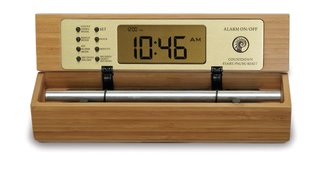 Bamboo Zen Meditation and Yoga Timer Now & Zen’s Chime Timer Store
1638 Pearl Street
Boulder, CO 80302
(800) 779-6383
Posted in Well-being, yoga, Yoga Timer, Yoga Timers by Now & Zen
« Previous Entries
Next Page »
|
|
|
|